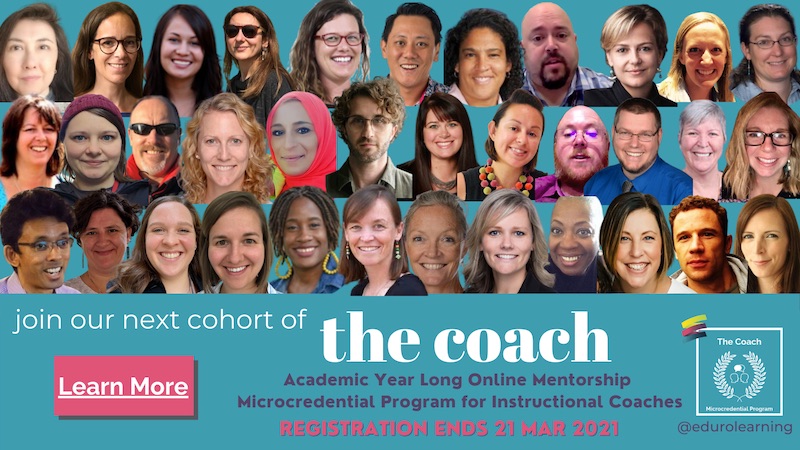Today’s post is a summary of highlights from a recent #coachbetter podcast episode featuring our panel of experienced coaches. If you’re interested in hearing the full episode, you can find it here. These are all five elements that our coaches from around the world wish they had when they were starting out as coaches. If you’re on a journey to become a learning coach, these are five ways that you can really excel sooner, like shortcut to success.
1:: Get Trained
Seems like a kind of obvious first stop, but so many coaches that have been in their positions for a long time didn’t have access to training designed for coaches. The position is relatively new, and so many coaches have found themselves in the role based on school needs, interested and enthusiasm, rather than formal training.
Either way, if you haven’t had any formal training yet, now is a great time to add that to your list of achievements! Ideally, what you might want to look for in a coaching program is:
- background on coaching models (not just ONE), so you can adapt and adjust for your context
- practical opportunities to build coaching skills, like questioning, facilitating effective coaching conversations, navigating difficult conversations
- learning about the coaching theory, understanding the difference between consulting, collaborating and coaching
- applying the coaching cycle so you have some formal practice working with a framework.
Side note: All of these elements are part of The Coach Microcredential because we know this is exactly what coaches need (and want) in their professional learning!
2:: Practice Your Skills
The second thing is find opportunities to practice your new skills and see success. So that’s success leading to success. The idea is you want to make sure you have some sort of framework for holding yourself accountable for trying out those new skills that you’re learning in that training or that content theory from step number one, you want to make sure you’re applying those frameworks and processes and skills actually with the teachers that you’re working with and seeing what it feels like to test out all those skills and giving yourself an opportunity to reflect what went well and what might not have gone so well.
Another side note: this is one of the best things about The Coach: every aspect of the program is designed for you to actually implement your learning with your colleagues, so that you are coaching right away, and reflecting on and unpacking those experiences with your cohort.
3:: Build Relationships
The third thing you want to do is build some solid relationships. Lots of our podcast guests talked about having mentors to help guide you through the early days of being a coach. You want an experienced coach to work with to have those deep reflective conversations so that you can really think about what’s working and what’s not working for you and get your questions answered. You also want to have someone who is a sounding board, who you can bounce your ideas off of.
Another one: The Coach also includes mentorship for the duration of the program – an entire academic year! So as a coach, you get your own coach to work with you as you apply your new skills in context.
4: Build a PLN
The fourth tip is to build a PLN, to connect with other coaches, whether they’re in your face-to-face environment or whether it’s online through Twitter or another social network, and find a supportive network of colleagues within your school community too. So that, you know, you have people that you can chat with and kind of build ideas with right there in your school setting.
Of course, the Coach also includes a global cohort of learners, so you are already expanding your PLN, just by joining!
5:: Solicit Feedback
That leads us to the final tip, which is soliciting feedback. That might be feedback from your supportive network of colleagues right there in your building. It might be from your coaching peers. It might be from your mentor. It might be from teachers that you’re working with and just listen to what they have to say, kind of analytically without taking it in on a personal level. So you can continue to build your coaching skills while you’re in that role, or even as you’re just getting started.
Watch the 5 Min Fri Episode
Level Up Your Learning with The Coach Microcredential
The great thing about these five tips, training with some content and opportunity to practice your skills with accountability, building a relationship with a mentor, finding and building a PLN and getting feedback from colleagues. All five of those things are actually included in our Eduro Learning The Coach Microcredential. The Coach is an academic-year-long online mentorship and course with 26 weeks of coaching content learning, plus a private cohort where you can build your PLN and have those conversations where you’re getting feedback from your peers and a private mentor where you can build that mentoring relationship.
So you can have a sounding board, get your questions answered and kind of talk through any coaching challenges you might have. Plus because of all that core content learning, there’s actual practical tasks that give you accountability to try out those new skills and see what’s working. And then you get feedback directly from your peers in the cohort and your mentor and all of the other participants via the forum and weekly video. Check-ins just like this, where you’re talking to your mentor and the other peers in your cohort. At the very end, you even get a certificate that says that you are in a Eduro Learning Certified Coach.
If you are ready to level up your coaching this academic year, The Coach is for you! Learn more here!


Recent Comments